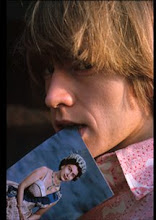

Perhaps Greg Shaw, one of rock music's most eloquent champions, put it best: The Move "created the absolute synthesis of commercial pop, heavy, metallic underground rock and experimental studio techniques." Having one of Britain's finest songwriters among the ranks certainly helped propel the Move into cult status as well; Roy Wood's quirky lyrics echo a purely British sensibility and compliment the Move's pop art sound and image. The classic Move line up included the shy, creative leader, singer and multi-instrumentalist Roy Wood. Lead singer Carl Wayne provided strong vocals, a pin-up face, and outrageous on-stage antics. The other members included Ace Kefford on bass, Bev Bevan on drums, and Trevor Burton on guitar. The Move's music ranges from freakbeat to R&B to power pop to psychedelia to California-style jams, covering a great deal of ground over four albums from 1967 to 1972.
Even down to their choice of band name, the Move punctuated the pop art music movement with their sensational live shows, which often included the violent destruction of television sets, cars, and effigies of Hitler. The Move also hold the distinction of being the only pop band to be sued by a Prime Minister--Harold Wilson--who won a libel suit against the band because their manager, Tony Secunda, had issued a promotional postcard insinuating that Wilson was having an affair with his secretary. To this day and in perpetuity, any royalties from the Move's "Flowers in the Rain" are given directly to charity. To Secunda, no publicity was bad publicity! However, the Move were much more than gimmicks--their music was sensational.
In 1970, former Idle Race leader and future Electric Light Orchestra mastermind, Jeff Lynne, joined the Move upon the exit of Carl Wayne. Roy Wood had been seeking an outlet for more experimental sounds and decided to form ELO out of the ashes of the Move. After a short time, Wood left to form Wizzard, and Jeff Lynne, still with drummer Bev Bevan, took ELO into the stratosphere.
The Move's catalog has recently been remastered and expanded into deluxe editions by the Salvo label, who also recently issued a 4 disc Anthology with many rare, previously unavailable tracks. Of course, the fan that I am recommends everything that the Move ever recorded. My friend Paul actually has an original mono copy of their first LP, as well as an original Something Else EP, which is the best way to hear them, I'm sure! As far as sound quality goes, the best in my collection is an old Pickwick The Move's Greatest Hits Vol. 1 LP--it can be found for cheap, and it sounds great! I also think the Movements box set is a great bet, but one would also need to get a seperate CD of Message From the Country, which was not included in the set (different record labels).
References: "The Move - The Five from Birmingham" liner notes by H.J. Simon, The Move Anthology 1966 - 1972 book included in the box set by Mark Paytress, and various articles.
Even down to their choice of band name, the Move punctuated the pop art music movement with their sensational live shows, which often included the violent destruction of television sets, cars, and effigies of Hitler. The Move also hold the distinction of being the only pop band to be sued by a Prime Minister--Harold Wilson--who won a libel suit against the band because their manager, Tony Secunda, had issued a promotional postcard insinuating that Wilson was having an affair with his secretary. To this day and in perpetuity, any royalties from the Move's "Flowers in the Rain" are given directly to charity. To Secunda, no publicity was bad publicity! However, the Move were much more than gimmicks--their music was sensational.
In 1970, former Idle Race leader and future Electric Light Orchestra mastermind, Jeff Lynne, joined the Move upon the exit of Carl Wayne. Roy Wood had been seeking an outlet for more experimental sounds and decided to form ELO out of the ashes of the Move. After a short time, Wood left to form Wizzard, and Jeff Lynne, still with drummer Bev Bevan, took ELO into the stratosphere.
The Move's catalog has recently been remastered and expanded into deluxe editions by the Salvo label, who also recently issued a 4 disc Anthology with many rare, previously unavailable tracks. Of course, the fan that I am recommends everything that the Move ever recorded. My friend Paul actually has an original mono copy of their first LP, as well as an original Something Else EP, which is the best way to hear them, I'm sure! As far as sound quality goes, the best in my collection is an old Pickwick The Move's Greatest Hits Vol. 1 LP--it can be found for cheap, and it sounds great! I also think the Movements box set is a great bet, but one would also need to get a seperate CD of Message From the Country, which was not included in the set (different record labels).
References: "The Move - The Five from Birmingham" liner notes by H.J. Simon, The Move Anthology 1966 - 1972 book included in the box set by Mark Paytress, and various articles.










